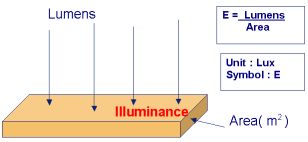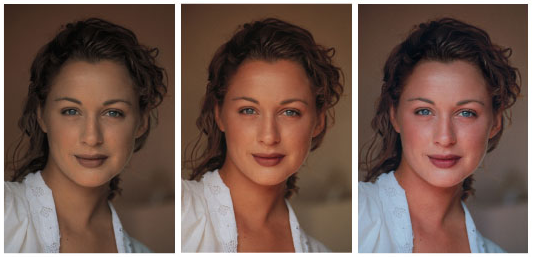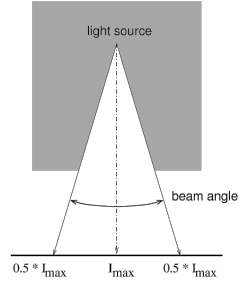
Technical terms for LED lighting
Luminous Flux
Luminous flux is the total amount of visible light emitted by a light source per
second, which is measured
in Lumen (lm). This is used to compare the lighting power of different light sources.
The
luminous flux of a candle is around 12.6lm
Illuminance
Illuminance is the total luminous flux incident on a surface, per unit area. It
is measured in lux
(i.e. lm/m2).
When we consider if the desk is bright enough, we are talking about illuminance. The indoor illuminance is
recommended to be around 100~300lux.

e.g. For a desk of 0.5m2, if the total luminous flux incident on the desk is 100lm,
the illuminance on the desk would be 100/0.5 = 200 lux, that is 200 lm/m2.
In general, illuminance is affected by the following factors.
i) Brightness of the light source - The brighter the light source, the higher the illuminance.
ii) Diffuseness of the light source - The more concentrate the light source, the higher the illuminance.
iii) Distance from the light source - The closer the distance, the higher the illuminance.
Some practical examples:
| Summer in the cloudy sky at noon | 100000 lux |
| Above, but in the shadows | 10000 lux |
| Outdoor, covered with thick clouds in the sky | 5000 lux |
| Artificial light, in the light of the office | 1000 lux |
| Artificial light, in the common living room | 100 lux |
| Street lighting | 5-30 lux |
| Full moon night in the bright and clean | 0.25 lux |
Straight
Down Illuminance
(1m)
In general, the brightness is maximum when it is measured straightly under a
light source. Straight
down
illuminance (1m) is the illuminance measured at 1m straightly under a light source. It is used to measure
the brightness under a light source.
Luminous Efficacy
It is the power efficacy of a light source, which is calculated by "Luminous
Flux / Power Consumption".
It is
measured in lm/W. It is useful to compare which light source is more energy
efficient.
Color Temperature
It is a measure of the color (frequency) of the light source. It is measured in Kelvin (K).
3000-4000K is warm white (i.e. yellow light), 5000-6000K is cool white (i.e.
white light),
Color Rendering Index (Ra) (0-100)
The appearance color of an object would be different when it is lighted up by
different light sources.
Color Rendering Index (Ra) indicates how well a light source renders colors of people and objects, compared
to a reference source. According to the definition, the Color Rendering Index (Ra) of sun light is 100. For
a light source with higher Color Rendering Index (Ra), the appearance color of an object under this light
source would be closer to it's original color. The Color Rendering Index (Ra) of LED is over 70.
Color Rendering Index (Ra) is only useful for comparing light sources of same color temperature (i.e. color).
It is meaningless to compare the Color Rendering Index (Ra) of light sources of different color temperature.

3000K (yellow light) 3000K (yellow light) 6500K (white light)
CRI 52 CRI 82 CRI 82
Beam Angle
Beam angle is a measurement telling you how wide is the light from a light
source. It is the angle between
those points on opposite sides of the beam axis where the intensity drops to 50% of maximum. Spot light
is much more concentrate then ceiling light. Beam Angle of spot light is around 30 degree, and that of
ceiling light is around 140 degree.

Advantages of LED lighting
1. High luminous efficacy and much more power saving, while it's life could be up to 50000
hours.
2. High lighting power with low heating effect. LED is a green and durable lighting source.
3. Lead and mercury free, LED is much more safe than compact fluorescent lamp.
4. Free of infrared and ultraviolet, which means it would not attract bugs.
5. Built in AC/DC transformer, which makes the light stable without flashing. This would be
more healthy for eyes.
6. With soft and stable light, and free of electric current noise, LED lighting makes the
environment quiet and comfortable.
7. Wide applications, LED is suitable for any indoor and outdoor use. LED could be used in
any restaurant, club house, office and household.
8. Easy installation. LED lighting is compatible with most common lamp base, which means you
could simply replace your compact fluorescent lamp or other traditional lighting with LED
lighting.
9. Wide variety of colors are
available to suit your style.
For any inquiry, please contact us : sales@hkems.com back to index